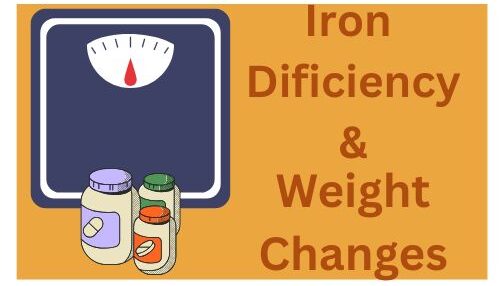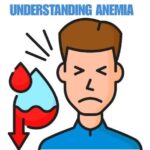Iron deficiency is the most common nutritional deficiency worldwide and the leading cause of anemia. But many people ask another question: does iron deficiency affect weight? The answer is yes—but not in the way you might think. The link between iron deficiency and weight changes is often indirect, tied to metabolism, appetite, and lifestyle adjustments.
In this article, we’ll explore how low iron impacts your weight, why both weight gain and weight loss are possible, and what you can do to restore balance.
What Is Iron Deficiency?
Iron is a vital mineral that helps your body make hemoglobin, the protein in red blood cells that carries oxygen. Without enough iron:
- Your cells and tissues receive less oxygen.
- You feel tired, weak, and sluggish.
- Your metabolism slows down.
Iron deficiency develops gradually. At first, you may feel subtle fatigue. Over time, it can lead to iron-deficiency anemia, which requires treatment.
How Iron Deficiency Affects Weight
Fatigue Reduces Activity
When you’re exhausted, daily activities feel harder. You may exercise less, skip workouts, or even move less around the house. Over time, this reduced activity means fewer calories burned, which can lead to weight gain.
Changes in Appetite
Iron deficiency can cause appetite changes in both directions:
- Some people lose appetite due to nausea, headaches, or stomach upset.
- Others crave quick energy foods—often sugary snacks or refined carbs—that can contribute to weight gain.
Metabolic Slowdown
Oxygen is essential for metabolism. Without enough oxygen, your basal metabolic rate slows. This means your body burns fewer calories at rest, making it easier to gain weight if eating habits stay the same.
Weight Gain vs. Weight Loss With Iron Deficiency
Not everyone responds to iron deficiency the same way.
- Weight gain: Often linked to inactivity, poor sleep, and increased cravings.
- Weight loss: Can happen when appetite drops or digestive issues interfere with eating.
- Weight fluctuations: Many people notice a mix of both depending on their symptoms and treatment.
Real-Life Example
Consider Mark, a 40-year-old office worker. He felt exhausted all the time and started skipping his gym sessions. To keep his energy up, he snacked on sugary foods. Within three months, he had gained 12 pounds. Blood tests revealed iron deficiency. After treatment, his energy returned, he resumed exercising, and his weight stabilized.
Lifestyle and Nutrition Tips for Managing Iron Deficiency and Weight
1. Eat Iron-Rich Foods
Include:
- Red meat, turkey, chicken
- Spinach, kale, and collard greens
- Lentils, beans, and chickpeas
- Iron-fortified cereals
Pair with vitamin C (citrus, peppers) for better absorption. Avoid excess coffee or tea near meals, as they reduce iron absorption.
👉 Learn more in our iron-rich foods guide.
2. Balance Your Plate
Don’t rely only on iron supplements. A balanced diet with protein, fiber, and healthy fats helps maintain steady energy and reduce cravings.
3. Stay Active, Even If Tired
Gentle activities like walking, yoga, or stretching can boost circulation and keep metabolism moving. As your iron levels improve, gradually increase exercise intensity.
4. Sleep and Stress Management
Poor sleep and high stress worsen both anemia and weight fluctuations. Aim for 7–9 hours of rest and practice relaxation techniques like deep breathing or meditation.
5. Work With a Healthcare Provider
Never self-diagnose iron deficiency. Blood tests are needed to confirm low iron. Your doctor may recommend iron supplements, intravenous iron, or other treatments depending on severity.
FAQs About Iron Deficiency and Weight Changes
Does iron deficiency always cause weight gain?
No. Some people gain weight, others lose weight. It depends on how fatigue, appetite, and metabolism are affected.
Can correcting iron levels help with weight loss?
Yes. Once iron deficiency is treated, energy and metabolism improve, making it easier to maintain or lose weight.
Does iron deficiency cause belly fat?
Not directly. Fat distribution depends on overall diet, hormones, and lifestyle. However, inactivity from fatigue can contribute to fat storage.
How long before iron supplements improve weight?
It varies. Some people notice improved energy in weeks, while full correction may take months. Weight often stabilises once energy levels return.
Key Takeaways
- Iron deficiency affects metabolism, appetite, and energy levels.
- Both weight gain and weight loss are possible outcomes.
- Proper nutrition, activity, and treatment are essential for balance.
- Addressing iron deficiency improves overall health and helps regulate weight.

The connection between iron deficiency and weight changes shows how important nutrition is for every aspect of health. While iron deficiency doesn’t directly make you gain or lose weight, its effects on energy, metabolism, and appetite can tip the scale in either direction.
The good news? With early diagnosis, proper treatment, and supportive lifestyle habits, you can restore energy, protect your health, and manage your weight more effectively.
More articles :






